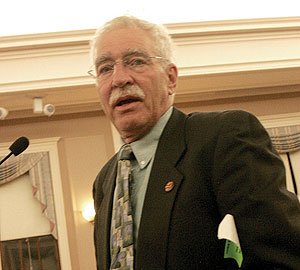
Sugar Law Center director Mark Stern says that an exclusive local hiring ordinance is possible. - Photo by Andrew Firestone
Aldermen weigh local hiring ordinance
By Andrew Firestone
Somerville has long suffered under the disproportionate ratio of jobs to laborers; there are only 21,000 jobs for around 45,000 workers who live in the city. Proposed over the summer by the Somerville Community Corporation, a local jobs ordinance was introduced to the Board of Aldermen, which would require all developers in the city who receive more than $50,000 in public funds to hire 30 percent of their workforce from Somerville.
While assistant city solicitor Matt Buckley wrote that such an ordinance would be deemed unconstitutional, as the fourteenth amendment prohibits such barring of out-of-state workers under the ‘Privileges and Immunities clause,’ debate began again in the legislative matters committee this last Tuesday, September 20, as the aldermen listened and questioned assistant city solicitor Jason Grossfield, and heard testimony from SCC legal counsel, the Sugar Law Center director Mark Stern.
“In order to survive a challenge under the Privileges and Immunities clause there must be a showing that non-residents must somehow be shown to be a peculiar source of the ‘evil’ at which the statute is aimed,” said Grossfield. He added that this could only be done using sophisticated and penetrating economic research.
The aldermen debated the pros and cons of passing an ordinance that exempted all out-of-state workers, which would be applicable to passage immediately, as it would not violate the fourteenth amendment. This is how the city of Cleveland for one was able to use such an ordinance to foster local jobs.
Stern said that the situation was not as open-and-shut as it might appear to the solicitor’s office. “If you’re passing this ordinance in Philadelphia, but you’re looking across the river to New Jersey, maybe the huge amount of competition is going to come from out-of-staters,” he said. He noted that Massachusetts was located to foster jobs for commuting workers from New Hampshire and Rhode Island.
The choice, if such an ordinance would be considered for passage, would be to either go all out, not exempting out-of-state workers from the calculation, such as in San Francisco, or to avoid such a possibly losing situation and exempt out-of-state workers from the ordinance. Similar ordinances have been found to be unconstitutional in Massachusetts within the last decade, including Lowell in 2001, and Worcester in 2002, both of which had their ordinances revoked.
“Now you can craft an ordinance that falls in between these two extremes. If you do so, I agree, the more information that you have to support the proposition that promoting local hiring is addressing a serious problem of the city and promoting it in specifically with respect to out-of-staters,” said Stern.
“I don’t think that you have to find that the out-of-staters are the particular evil, but I think if you find that they are part of the problem, and that an important way to remedy that is to include them in, the ordinance can pass muster.”
The ordinance would only apply to City or State funds, and could not include projects that use federal funds, such as funds from the stimulus programs, as those are mandated to be used without restrictions.
BOA president Rebekah Gewirtz said she supported the ordinance, but noted that they board and committee needed to be “very careful about how this is crafted.”
Debate for the ordinance, and possibly initiating such a study to prove the economic hurdles faced by local laborers in competition with out-of-state workers, was tabled until next committee meeting.















Reader Comments